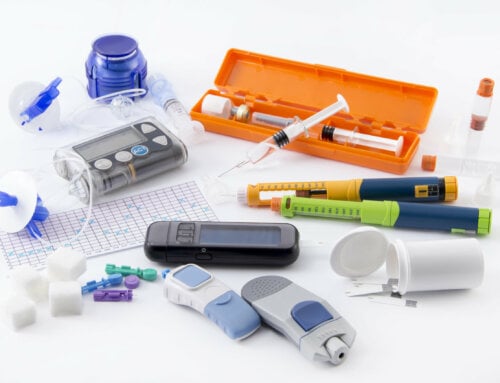This week alone during diabetes education sessions I instructed 4 patients who have different stages of kidney disease, including one gentleman who will soon be starting dialysis. None of these patients had prior diabetes education – although each one has had diabetes for 8 years or more. The truth is many of these problems could have been prevented. I wanted to share some basic knowledge about kidneys and what you can do to hopefully avoid kidney damage in the future.
The cost of kidney failure is the U.S. is $20 billion annually. Over 26 million Americans have kidney disease. Roughly 30% of people with type 1 diabetes and 20 – 40% of people with type 2 diabetes will develop kidney disease. The good news is with moderate changes and treatment you can slow or reverse kidney damage.
Basic Kidney Function 101: We have 2 kidneys that sit near the middle of our back, are the size of your fist and are shaped like kidney beans. Their job is to process blood – sift out waste and excess water, filter out drugs and chemicals as well as regulate blood pressure, maintain calcium levels and make red blood cells (RBC). The kidneys release certain hormones which help with these processes. Erythropoietin is a hormone made by the kidneys which stimulates our bone marrow to make RBCs. Another kidney hormone is Rennin, which helps regulate blood pressure and the third one is Calcitrol – an active form of vitamin D which helps bones maintain calcium.
What effects kidney function? The leading causes of kidney disease and kidney failure are uncontrolled diabetes and hypertension. Other causes can be untreated bladder and kidney infections or medications and chemicals. Diabetic nephropathy occurs when elevated blood sugars irritate and inflame the delicate nephrons of the kidney; this prevents them from doing their job. Uncontrolled blood pressure is detrimental to optimal kidney function. Treating the blood pressure is fine but make sure your kidney function is being monitored as well. People over 65 have a higher incidence of kidney disease. African Americans, Asian Americans, Hispanics, Islanders, and Native Americans as well as people who have a family history of kidney disease are also at a higher risk.
What tests should be done to check your kidney function? Your health care provider should be looking at kidney function by testing both blood and urine specimens. The urine should be tested for micro albumin (a protein which appears at the beginning of kidney problems) called proteinuria. Protein should stay in the body. The needed blood tests are GFR or glomerular filtration rate (measures how much blood the kidneys filter each minute) as well as serum creatinine level (a waste product that should be excreted) and BUN. More specific tests such as a 24 hour urine collection, bladder and kidney ultrasounds and other scans can be ordered by a nephrologist who specializes in kidney disorders if needed. If kidney function is stable it is usually checked once a year. If you have established disease you may be monitored every 3 months when your A1C is checked.
What are symptoms of kidney disease? Early kidney disease displays no symptoms and that is why it is important to be periodically checked. Beginning symptoms generally occur when kidney function is down to 60% operation. They may include fatigue, decreased appetite and general malaise. As the disease progresses symptoms can include swelling or puffy hands, face, eyes and feet. Itchy skin, extreme weakness, nausea and vomiting and increased urination may also be present. Kidney function should be at least 25% and when it drops to 10-15% a kidney transplant or dialysis will probably be considered. People with kidney disease are also at elevated risk for heart attacks and strokes.
How to keep you and your kidneys healthy?
- Start with blood sugar control. Those people who can consistently maintain their A1C below 7% have much less kidney involvement.
- Blood pressure control is a must! Most physicians treat blood pressure in people with diabetes even if it is not high. They generally prescribe an ACE inhibitor or ARB blood pressure medication (many people have an allergy to ACE inhibitors which presents as a dry, chronic cough). These specific medications are used since they treat blood pressure as well as protect kidney function. Many times these medicines can reverse early protein in the urine.
- Start eating a healthy food plan emphasizing fruits, vegetables, and lean proteins-watch amounts of red meat, eat low fat dairy and small portions of grains including rye, oats, quinoa, millet, beans and legumes. Decrease sodium to 1200-1500 mg a day and watch for hidden salt. Eliminate processed meats and sugar sweetened drinks. New studies suggest limiting rice and wheat choices.
- Stop smoking!
- Watch cholesterol and triglyceride values. Take medication if your physician suggests it.
- Partake in a moderate exercise routine.
- Limit caffeine and stress.
- Try to get close to your ideal body weight or at least make an effort to lose 5-7% of your current weight. Obesity doubles your risk of kidney disease.
- Meet with a registered dietician if your health care provider suggests a modified food plan cutting back on protein, fluids, potassium and phosphorous.
- Take medications as prescribed.
You can do a lot to reduce the risk of kidney disease so get started today!
NOTE: Consult your doctor first to make sure my recommendations fit your special health needs.






Leave A Comment